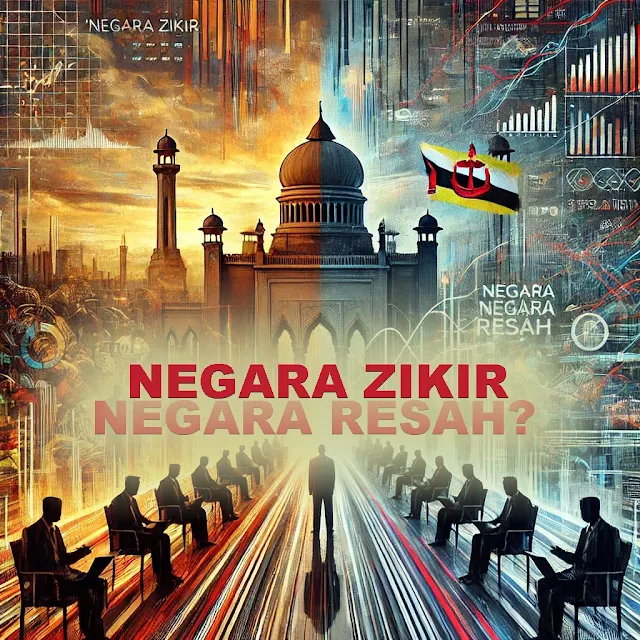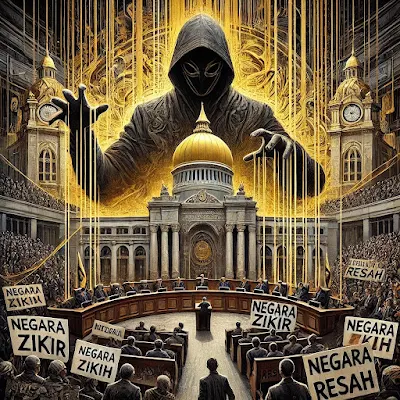🛑 The Nation We Aspire To, The Crisis We Cannot Ignore
Brunei was built on the ideals of Melayu Islam Beraja (MIB) - a kingdom rooted in faith, tradition, and unity. We envisioned a Negara Zikir, a nation that remembers God and strived for Baldatun Thayyibatun Wa Rabbun Ghaffur - a prosperous land under divine mercy.
But reality tells a different story. Out-of-wedlock births are rising. Cybercrime is preying on our youth. HIV infections surge. Elders are abandoned in hospitals.
Is this the Brunei we dreamed of?
The Legislative Council’s 12th-day proceedings exposed these painful truths, forcing the nation to confront the growing cracks in our social fabric.
By Malai Hassan Othman
BANDAR SERI BEGAWAN – Lawmakers laid bare the challenges facing Brunei as crime, cyber fraud, youth vulnerabilities, elder neglect, and zakat mismanagement dominated discussions.
The Legislative Council’s 12th-day proceedings revealed troubling trends in Syariah crimes, financial scams, welfare dependency, and public health crises, raising urgent questions about policy direction and national preparedness.
“Are we losing control, or are we merely better at catching criminals?” one legislator asked, challenging the Ministry of Religious Affairs’ enforcement strategy.
With a staggering 4,489 out-of-wedlock births in a decade, 72% involving Malay Muslims, concerns mounted over moral decline and ineffective intervention.
Adding to the debate, the ministry’s annual target of 350 Syariah crime cases sparked intense scrutiny.
In the previous year (FY 2023/24), only 160 Syariah crime cases were recorded, meaning the new target more than doubled the actual cases reported. This raised fundamental concerns:
- Why was the target set so high? Was it based on a projected rise in moral offences, or was it meant to push stricter enforcement?
- Does increasing targets signal a failure in prevention? Shouldn’t the goal be to reduce such cases rather than expect them to rise?
- Is enforcement being measured by conviction numbers rather than meaningful intervention? A high conviction rate doesn’t necessarily mean a healthier society.
📌 Zakat: The Delayed Lifeline
Another contentious issue was zakat management, particularly the delays in disbursing zakat funds.
Some zakat applications have been pending for 3 - 4 years, lawmakers revealed, leaving families in need waiting indefinitely.
A dual-processing system was introduced to clear the backlog while reviewing new applications in parallel, but concerns remain over whether this will be enough to ensure swift assistance.
Lawmakers also debated business zakat (zakat perniagaan), pointing out that while corporate zakat is obligatory under Islam, it remains voluntary in Brunei.
There were calls for a stronger zakat compliance framework to ensure all eligible Muslim-owned businesses contribute annually.
Additionally, a digital tracking system for zakat collection and distribution was proposed to improve transparency and prevent inefficiencies.
“Are we simply handing out aid, or are we lifting people out of poverty?” one member asked, urging reform in zakat investment strategies to support long-term economic empowerment.
🔔 The Wake-Up Call: A Nation at a Crossroads
For years, Brunei has prided itself as a model of stability, prosperity, and faith. But beneath the surface, social fractures are deepening.
Crime is rising. Values are eroding. Vulnerable citizens are slipping through the cracks.
The LegCo 12th-day proceedings have spoken. The data is clear. The time for complacency is over.
The question remains - will we act, or will we watch?
We invite you to join the conversation. What do you think should be done? Share your thoughts. Let’s build a better Brunei - before it’s too late. (MHO/03/2025)



.jpeg)
No comments:
Post a Comment